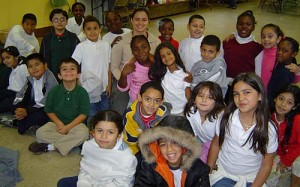It's back to school time. Students all over the US -- and the world -- are putting their backpacks on and heading out their doors to the institutions where they will (if all goes well) learn the skills they need to succeed in life. This year purse strings are tight, and the challenges for parents and administrators, let alone for the kids in their care, are greater than ever.
Here is a selection of the issues that they face: principals are working with smaller budgets than in the past, forcing them to make tough choices about art programs or building repairs. Teachers are struggling to keep distracted students away from Facebook -- children who may be much more tech savvy than the adults themselves. Meanwhile some schools are investing huge amounts of time and money into technology, although the benefits of digital learning are not fully understood or known. We live in an era when hard work and education are vital to a child's success, but many schools are not performing as well as people think. Yet if we can teach our kids the Triple-E Rule -- the importance of education, entrepreneurship and ethics -- then they will be well equipped to live autonomous lives.
Several of these difficulties are particular to the US, but a few are universal. In Bahrain last year, at the Education Project (an event produced by Richard Attias), Crown Prince Shaikh Salman bin Hamad bin Isa Al-Khalifa, who was hosting the conference, said, "We all know there are gaps in the quality of the world's education systems. We all know that, in spite of good intentions, increased spending on education often fails to deliver the expected improvements." His remarks hold true for the US, Europe, and for MENA.
At the same time there is plenty of evidence of brilliance and innovation in the field of education. The people behind Skype have launched "Skype in the Classroom" -- a global initiative designed to help teachers and students to connect with others (Skype's CEO Tony Bates spoke about it recently on Mashable.com). A young tech star called Jonathan Hefter has created a product called Neverware, which allows old computers to work like new and thus helps schools to save money.
And as education changes, so do our ways of thinking about it. This month the New York Times has set up an exciting project called SchoolBook. In collaboration with WNYC and local sites, and headed up by Times' education editor, Jodi Rudoren (herself the mother of twins who attend pre-K at public school), it offers a digital community space, where parents, principals and policy-makers can share their thoughts.
On September 22, Rudoren will talk about education at "Schools for Tomorrow," a conference run by the New York Times and produced by Richard Attias & Associates, the creator of the New York Forum. Jacqueline Botterill, who devised the concept behind "Skype in the Classroom" is another speaker, as is Jonathan Hefter, the 25-year-old Neverware founder.
"Schools for Tomorrow" brings together a unique group of educators and experts. Its mission is to "harness the power of technology to improve the learning experience. Democratize access to quality education. And elevate the American student to a higher level." In November, Qatar too will host the Wise Summit, an international collaboration of leaders and practitioners across the field.
All these initiatives should be supported by governments and by the private sector. Leaders and decision-makers should attend in order to learn and take back ideas to which they can implement in their own organizations.
These platforms are laboratories of ideas. We cannot just watch young people in the streets who are without hope because they had the wrong start, and do nothing. It is our duty to give them the right passport to navigate through life: education.
